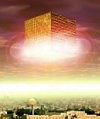|
THERE IS A DISTINCTION BETWEEN appearance and reality, between what seems to be real and what really is real. Indeed people are often mistaken in their perceptions, believing something is true when it is later determined to be false. n the realm of everyday physical objects, for example, we regularly make assumptions about things that, upon closer inspection, are shown to be less certain. For example, we might describe a billiard ball as having a certain color or a smooth texture, but if we look through a microscope at the ball, we would see irregularities in the surface and variations in color. The ball, as we initially perceived it, does not match the new information we obtained after we've taken a closer look. Similarly, a crime might be "explained away" by appealing to socioeconomic causes or psychological categories, though upon closer inspection we begin to discern other motives, such as selfishness, malice, vindictiveness, and indeed ontological (i.e., demonic) evil.... Yesh derekh yashar lifnei ish, ve'acharitah darkhei mavet: "There is a way that seems right to a person, but in the end it is a way of death (Prov. 14:12). Wisdom bears in mind the distinction between seeming and reality, and thereby avoids quick judgments.
How we choose to see and how we interpret what we see often says more about us than it does the thing we're looking at. To those without faith in its words, the Scriptures appear as the product of a human hand, devoid of any special sanctity, and fully explainable using a set of "natural" assumptions. But to those whose eyes are "uncovered," the words of Scripture are full of glorious (and sometimes dreadful) wonders about the unseen world. The veil is pulled back and we are given a glimpse of reality and truth. In every case, however, each person is fully responsible before Eternity for what he or she chooses to believe about what is of ultimate concern and significance. No one can opt out of their answer before the bar of heaven; no one is free to disown what they choose to believe...
|



